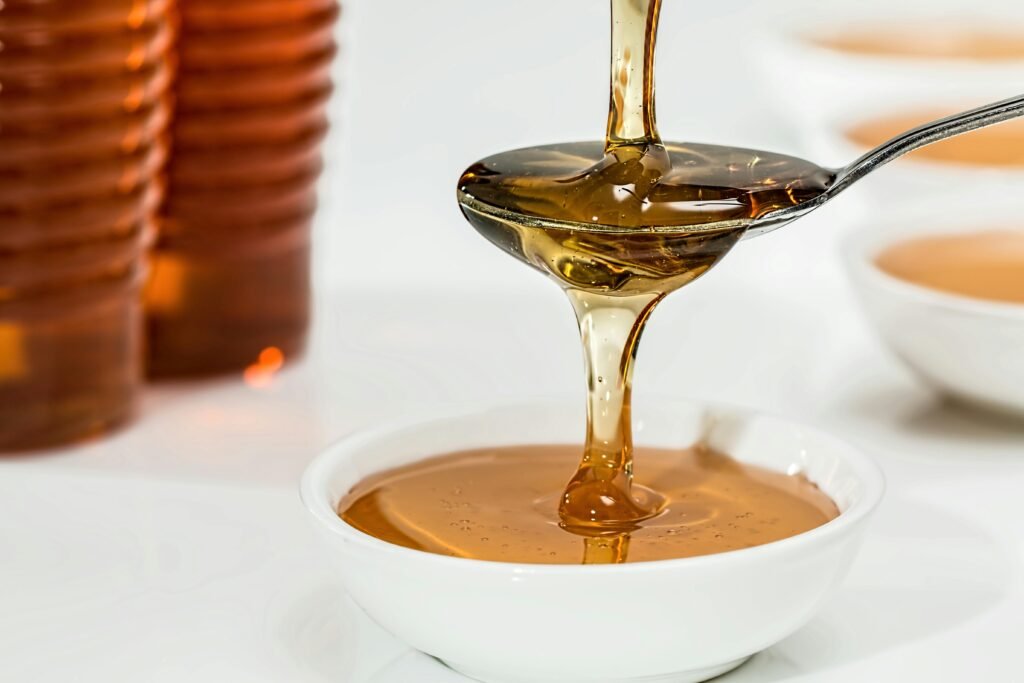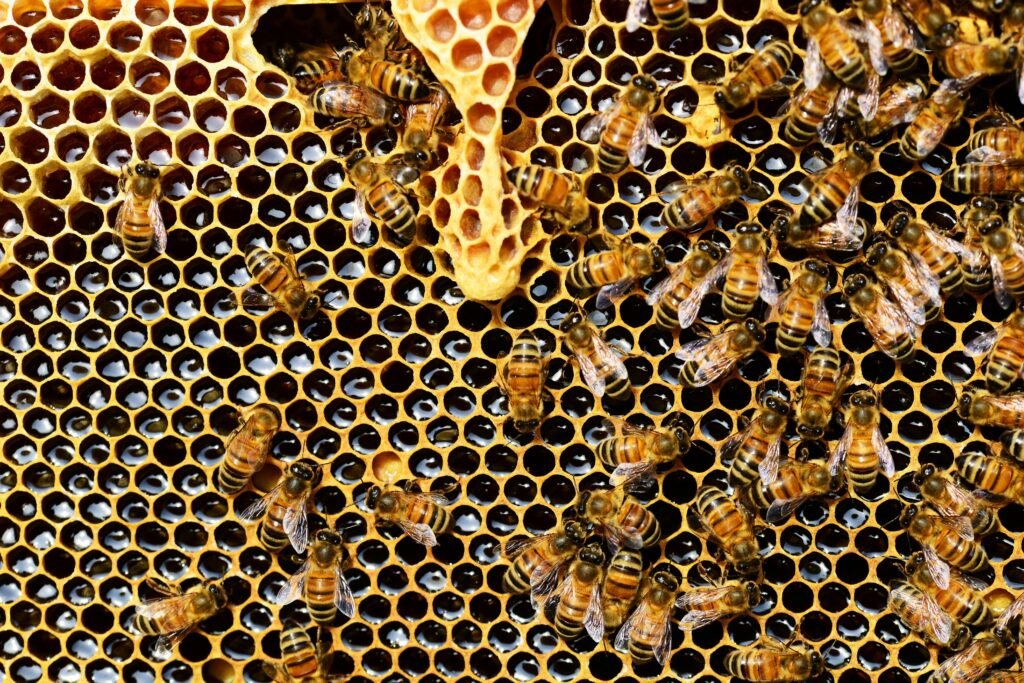Hello there, fitness lovers and health enthusiasts! Today, we’re diving deep into a natural energy booster food, the sweet, sticky world of honey. Not only is honey a delicious natural sweetener, but it also packs a punch when it comes to health benefits. From boosting your physical health to enhancing cognitive function, honey is truly a golden elixir. So, grab a spoonful of your favorite honey and let’s explore its myriad benefits of honey!

What is Honey?
Before we delve into the benefits, let’s understand what honey is. Honey is a thick, golden liquid produced by bees from the nectar of flowers. It’s a natural sweetener that has been used for centuries in both culinary and medicinal applications. The unique taste, aroma, and composition of honey depend on the flowers from which the nectar is collected.
Nutritional Profile of Honey
Honey is not just sugar; it’s a complex substance with a variety of nutrients. Here’s a glimpse of what’s inside:
- Carbohydrates: Primarily in the form of glucose and fructose, providing quick energy.
- Vitamins: Including B vitamins (B6, niacin, riboflavin, pantothenic acid) and vitamin C.
- Minerals: Such as calcium, iron, magnesium, manganese, phosphorus, potassium, sodium, and zinc.
- Antioxidants: Flavonoids and phenolic acids that help combat oxidative stress.
- Amino Acids: Essential for various bodily functions.
- Enzymes: Such as invertase, glucose oxidase, and diastase, which aid in digestion and other processes.
Benefits of Honey for the Body
1. A Natural Energy Booster
Feeling sluggish? A spoonful of honey can give you a quick and natural energy boost. The natural sugars in honey (glucose and fructose) are easily absorbed by the body, providing an immediate source of energy. Unlike artificial sweeteners or energy drinks, honey offers a balanced and sustained energy release.
Pro Tip: Add a tablespoon of honey to your pre-workout snack or smoothie for an extra energy kick.
2. Immune System Support
Honey is rich in antioxidants and has antibacterial and antifungal properties, which can help strengthen your immune system. The antioxidants in honey help fight free radicals, reducing oxidative stress and potentially lowering the risk of chronic diseases.
Pro Tip: Incorporate honey into your daily diet by adding it to your tea, yogurt, or oatmeal to give your immune system a little extra support.
3. Healing Wounds and Burns
Honey has been used for centuries as a natural remedy for wounds and burns. Its antibacterial properties help prevent infection, while its anti-inflammatory properties reduce pain and swelling. Honey creates a moist healing environment, promoting tissue regeneration.
Pro Tip: Apply a thin layer of raw honey to minor cuts, burns, or abrasions, and cover with a bandage. Change the bandage and reapply honey daily for optimal healing.
4. Digestive Health
Honey can be beneficial for digestive health in several ways. It acts as a prebiotic, feeding the good bacteria in your gut, which are essential for digestion and overall health. Honey also has mild laxative properties, which can help alleviate constipation. Honey will help you to increase your metabolism power.
Pro Tip: Start your day with a glass of warm water mixed with a teaspoon of honey and a squeeze of lemon to aid digestion and detoxify your system.
5. Soothing Sore Throats and Coughs
One of the most well-known uses of honey is as a remedy for sore throats and coughs. Honey coats the throat, providing relief from irritation. Its antimicrobial properties can also help fight off the bacteria causing the infection.
Pro Tip: Mix a tablespoon of honey with warm water or herbal tea to soothe a sore throat. For a more potent remedy, add a squeeze of lemon juice and a pinch of ginger or cinnamon.
6. Skin Care
Honey is a popular ingredient in many skincare products due to its moisturizing and anti-inflammatory properties. It can help treat acne, eczema, and other skin conditions. Honey also acts as a natural humectant, drawing moisture into the skin.
Pro Tip: Use honey as a face mask by applying a thin layer to your skin and leaving it on for 15-20 minutes. Rinse off with warm water for soft, glowing skin.
7. Allergy Relief
Local honey can help alleviate seasonal allergies. The theory is that consuming small amounts of local pollen present in honey can help desensitize your body to the allergens, reducing allergic reactions over time.
Pro Tip: Look for raw, unfiltered local honey and incorporate a teaspoon into your daily diet, especially during allergy season.

Benefits of Honey for the Brain
1. Cognitive Function and Memory
Honey’s rich antioxidant profile can help protect the brain from oxidative stress and inflammation, both of which are linked to cognitive decline and neurodegenerative diseases. Some studies suggest that honey can enhance memory and learning.
Pro Tip: Add honey to your morning routine, such as in your tea or breakfast smoothie, to support brain health and function.
2. Reducing Anxiety and Improving Mood
Honey contains natural sugars and polyphenols that can have a calming effect on the brain. These compounds help reduce anxiety and improve mood by regulating neurotransmitters and reducing inflammation in the brain.
Pro Tip: A warm glass of milk with honey before bedtime can help relax your mind and improve sleep quality, which is crucial for mental health.
3. Neuroprotective Effects
The antioxidants and anti-inflammatory properties of honey can help protect the brain from damage caused by free radicals and inflammation. This protection is particularly beneficial in reducing the risk of neurodegenerative diseases such as Alzheimer’s and Parkinson’s.
Pro Tip: Regularly consuming honey as part of a balanced diet can contribute to long-term brain health.
4. Supporting Sleep
Honey can help improve sleep quality by promoting the release of melatonin, a hormone that regulates sleep. The natural sugars in honey cause a slight rise in insulin, which in turn promotes the release of tryptophan. Tryptophan is converted into serotonin, which is then converted into melatonin in the brain.
Pro Tip: A teaspoon of honey in herbal tea or warm milk before bed can help you drift off to sleep more easily.
Different Types of Honey and Their Unique Benefits
Not all honey is created equal. Different types of honey offer unique benefits based on their floral source and processing methods. Here are a few popular varieties:
1. Manuka Honey
Manuka honey, produced from the nectar of the Manuka tree in New Zealand, is renowned for its potent antibacterial properties. It contains high levels of methylglyoxal (MGO), which contributes to its antimicrobial activity.
Benefits: Wound healing, digestive health, immune support.
2. Clover Honey
Clover honey is one of the most common types of honey, with a mild, sweet flavor. It’s rich in antioxidants and has antibacterial properties.
Benefits: General health, skin care, allergy relief.
3. Buckwheat Honey
Buckwheat honey is dark and robust in flavor, with higher antioxidant levels than lighter honeys. It’s particularly effective for soothing coughs and sore throats.
Benefits: Respiratory health, antioxidant support.
4. Acacia Honey
Acacia honey is light and mild, with a high fructose content that keeps it liquid longer. It’s rich in flavonoids and has strong antibacterial properties.
Benefits: Digestive health, immune support, skin care.
5. Wildflower Honey
Wildflower honey is made from the nectar of various wildflowers, giving it a unique and complex flavor. It’s rich in antioxidants and nutrients.
Benefits: Allergy relief, immune support, general health.

How to Incorporate Honey into Your Diet
There are countless ways to enjoy the benefits of honey. To maintain a healthy diet everyday you can add honey to your healthy meals. Here are a few simple and delicious ideas:
- Drizzle Over Breakfast: Add honey to your oatmeal, yogurt, or pancakes for a natural sweetener.
- Sweeten Beverages: Use honey in your tea, coffee, or smoothies instead of sugar.
- Baking Substitute: Replace sugar with honey in baking recipes for a healthier alternative.
- Salad Dressings: Mix honey with olive oil, vinegar, and mustard for a tasty and healthy salad dressing.
- Marinades and Sauces: Use honey in marinades for meat or as a glaze for roasted vegetables.
Precautions and Considerations
While honey is a natural and healthy sweetener, it’s important to consume it in moderation. Here are a few precautions to keep in mind:
- High Sugar Content: Honey is high in natural sugars, so excessive consumption can contribute to weight gain and other health issues.
- Infants: Do not give honey to infants under one year of age due to the risk of botulism.
- Allergies: Some people may be allergic to honey or pollen. If you experience any allergic reactions, discontinue use and consult a healthcare professional.
- Diabetes: People with diabetes should monitor their honey intake, as it can affect blood sugar levels.
Conclusion
Honey is more than just a sweet treat; it’s a powerhouse of health benefits for both the body and brain. From boosting energy and supporting the immune system to enhancing cognitive function and improving mood, honey truly is a golden elixir. So, next time you reach for a sweetener, consider the natural goodness of honey.
Remember to choose high-quality, raw honey to maximize its health benefits. Incorporate it into your daily routine in creative and delicious ways, and enjoy the sweet rewards of better health.
Do you have a favorite way to use honey? Share your tips and recipes in the comments below. Stay sweet and healthy, everyone!
P.S. Always consult with a healthcare professional before making significant changes to your diet, especially if you have underlying health conditions or concerns.




Pingback: The Sweet Powerhouse: Unveiling the Benefits of Dates for Body and Fitness - Fat Burn Faster 2x